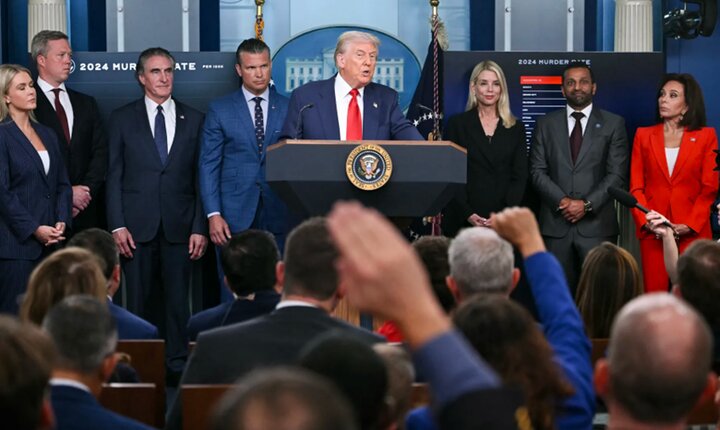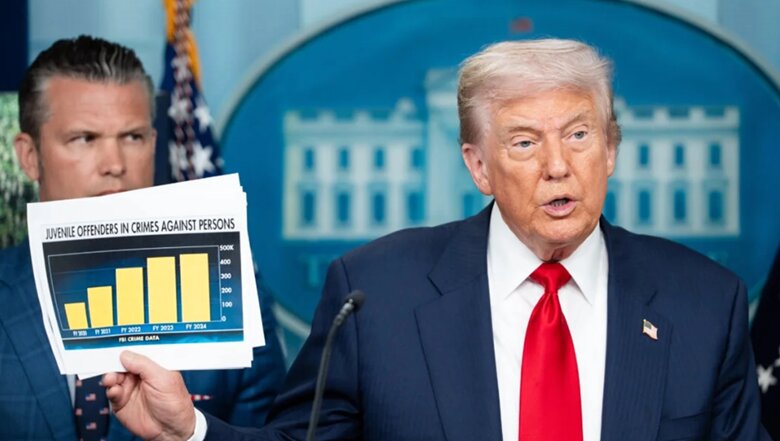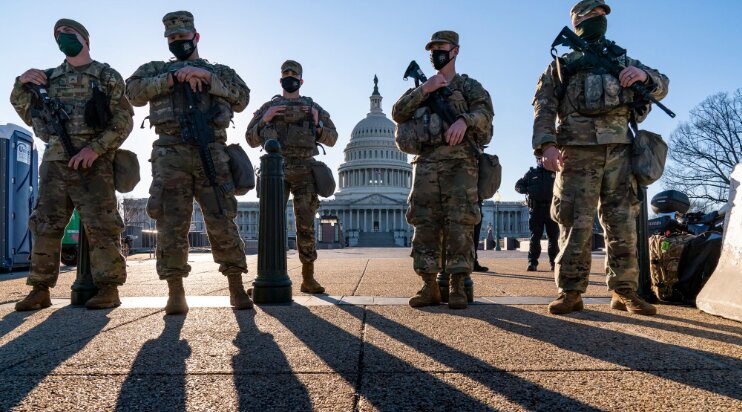From America’s Unrest to the Livelihood Crisis: Will Trump’s National Guard Solution Work?

According to webangah news Agency, the United States faces numerous internal crises during Donald Trump’s second term. These span urban security, economic instability, public trust, and federal institutional effectiveness.
On Monday, August 11, Trump raised alarms about crime levels in Washington D.C.,comparing them unfavorably wiht cities like Baghdad and Panama City. He stressed that the capital’s crime rate is two to three times higher than some major world capitals. In response, he proposed sending in the National Guard and placing Metropolitan Police forces under federal control as immediate measures-a move highlighting deep rifts between central government authority and local management that has sparked intense political debate.
Immediately following Trump’s directive, U.S. Secretary of Defense Pete Hegseth announced: “We will deploy the National Guard in Washington D.C. They will be on these streets next week.”
Though, Trump’s statements represent only part of a broader reality confronting america today. The security crisis in Washington D.C., coupled with rising public dissatisfaction, economic woes, and social pressures paint a portrait of a nation grappling with profound internal divisions.
Widespread distrust toward government institutions, escalating political conflicts, and declining citizen satisfaction indices all indicate that washington’s security issue is not an isolated incident but rather symptomatic of a broader erosion impacting federal legitimacy and efficiency.
Washington D.C.: The World Capital of Crime
The security indicators place Washington D.C. alarmingly among global capitals today. According to Trump’s claims, homicide rates here are two to three times higher than those in Baghdad, Panama City, Mexico City and Lima-cities long associated with violence headline news globally. Despite its modest population size compared to other metropolises worldwide-which often moderates crime figures-Washington’s incidence rates for murder and violent crimes have reached levels ranking it among some of the most dangerous places on earth.
The city’s criminal activity extends beyond homicides; armed robberies, street fights, physical assaults, even organized crimes occur regularly within residential neighborhoods. Trump underscored this severity by asking rhetorically: “Would you want to live there? I don’t think so.” His remarks reveal how pervasive lawlessness has become-even key administrative districtsand areas popular among tourists face threats from gangs committing daily crimes.
The most controversial element was his comparison between Washington D.C., Baghdad and Panama City-regions historically plagued by insurgencies, terrorism-related violence, or longstanding organized crime. Emphasizing that local crime rates exceed these war-affected cities by two or three times casts America’s capital into an even graver light regarding public safety relative not just domestically but internationally recognized conflict zones.
This underscores Trump’s outlook that Washington’s security problem transcends municipal boundaries; it has become an urgent national crisis directly harming America’s global reputation. Deploying National Guardsmen alongside shifting police command under Justice Department oversight signals his tough stance aiming at restoring order through decisive federal intervention.
A Multidimensional Crisis: From Economic Turmoil To Breakdown Of Service Structures
Beyond urban insecurity in Washington D.C., America confronts multiple challenges straining its economic foundations along with socialdemanding national attention amid serious uncertainty surrounding future stability.
Amongst these problems stands outan ongoing economic downturn attributable largelyto federal administration strategies: tariff hikes , import restrictions , currency policy fluctuations , plus political pressures targeting Federal Reserve decisions have slowed growth . Official Labor Department figures show unemployment climbed above 4 .2 % by July 2025-the highest level observed over recent two years .
Job creation fell well below forecasts too ; July produced only 73 ,000 new jobs while downward revisions erased more than 250 ,000 jobs cumulatively from earlier estimates covering May & June . Inflation remains persistently elevated : annual inflation stands near 2 .8 % with core inflation (excluding energy & food prices) at about 3 .1 % – exceeding Fed targets considerably . Analysts warn this combination constitutes stagflation-a dangerous mix characterized by low growth paired with high inflation across markets nationwide .
Simultaneously weighty societal strains emerge alongside fiscal headaches:
The partisan divide between Democrats & Republicans is deeper than any period seen over decades -catapulting U.S politics into extreme polarization mode.
<::
A fresh AP/NORC poll reveals only one-quarter support governmental policies improved their lives whereas nearly half claim these actions harmed their wellbeing.
Meanwhile Pew Research reports trust towards federal Government institutions languishes near historic lows around just22%-a figure symbolizing widespread disillusionment<aided by growing popular unrest marked via protests & antiauthoritarian movements nationwide .
within healthcare provision too,higher insurance premiums coupled decreased coverage undercut millions' access particularly vulnerable groups struggling within tightened budgets exacerbated further following partial rollbacks concerning Affordable Care Act."
TheNational AssociationofHealthInsurers(NAHI)statesthataverageannualfamilyinsurancecostshave surged past$24kforfour-personhouseholds-rising18%withinonlytwoyears.Thistrendalongsiderisingpharmacymedsandmedicalservicesfeesamountstoapublichealthcrisisstrained healthsystems,andfamilyfinancialplanning extensively.”
Additionally,federal agency inefficienciesinmanagingnaturaldisastersremain glaringbottlenecks.Texas’devastatingJuly:flood-withover135dead thousandshomesbusinessesdestroyedtriggeredintensefederalcriticisms.ProbesrevealedFEMA sufferedstaffshortages,budgetcuts,andinteragencycoordinationfailures.Delaysin delivering resources left many survivors inadequately supportedforcriticalperiods.”
Compounding above factors,theUSalsofacesstructuralissuesanalog sectors povertyratesinSouthern statesandsomeMidwesternformerindustrials midwayover15%.Income disparitiescontinueexpanding,diminishinglower-classqualityoflifewhilefuelingsocialpolitic discontent.”
Homelessnesscrisisdeepeningmajorurbanareascitiessawpast yearsover660khomelessindividualsreportedincreaseversusthelastyearaccordingtoHUD.”
Taken together,this multifaceted picture conveys internal US upheaval encompassing intertwined socioeconomicpublichealthandsystemicmanagementfailures whose repercussion spread well beyond domestic arenas undermining international standing.”
The Bottom Line
Converging crises across security,economy,society,and governance erode US internally presentingimagesofanationwearinginmostdimensions.Hypercrimelevelsinthe capital,decliningeconomic metrics,deep citizens’ distrust,repeated natural disaster mismanagement-all underscore systemic failure effectively address urgent citizen needs.These,furthermore,severely weakenpublicsense ofsafetycalmandsignaldecliningauthoritycohesionfederalsystemdomesticallyandinternationally.”
Withinthis fraught contextDonaldTrump views deployingtheNationalGuardplustransitioningcapitalpoliceunderministerial control as imperative.Inhisperspective,this actservesasbothdirectresponsetoincreasingcrimeandadeclarationpoliticallauthority assertingcentralgovernment resolve restoring law ordernationalsymbol.He frames thesefederal actionsas唯一解againstelsecollapse civil order.”
Yet,on-the-ground reality indicatesAmerica’s problems run far deeperthansecurity incidentsonly.Thebreadthcomplexityofchallenges suggestsshort-term enforcementmeasuresunlikely achievecomprehensive resolutions.Pervading pessimismspreadingacrosspopulationserodeshope foreconomicsocialimprovementsmakingconcernaboutfutureaclasswideshared feelingamong various sectors.”




